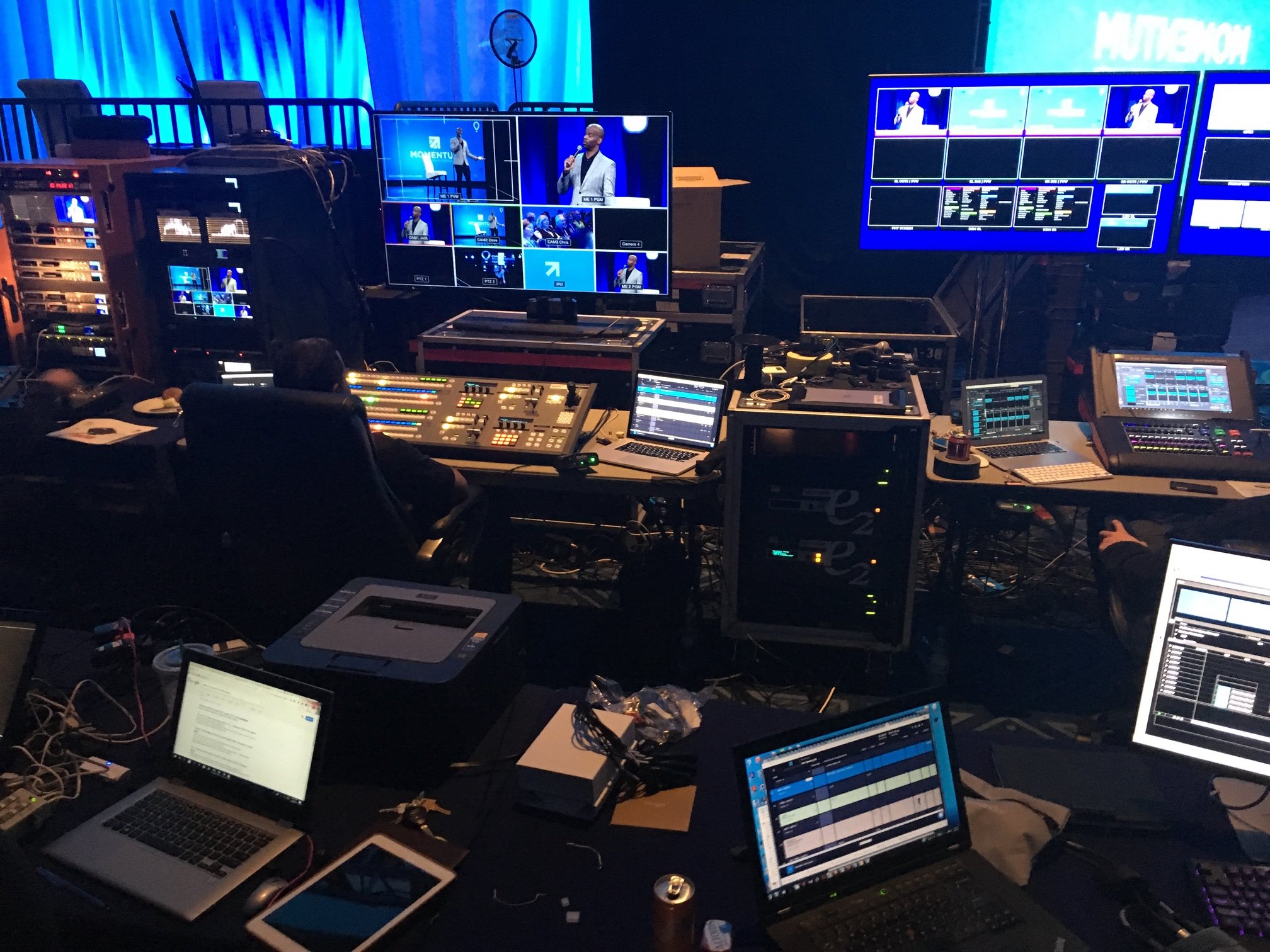How Event Production Functions: A Comprehensive Look at the Process
Event production is a complicated and structured process that calls for cautious preparation and implementation. It begins with developing clear goals and comprehending the target market. Each action, from budgeting to place choice, plays an essential role in making certain success. As the procedure unfolds, various components have to straighten effortlessly. Yet, the nuances of this complex operation commonly go undetected. What are the vital stages that add to an unforgettable event?

The Initial Preparation Stage
When beginning on event production, cautious preparation is crucial to ensure a successful outcome. The first preparation stage works as the structure for all subsequent initiatives. Throughout this phase, event producers have to define the event's objective and objectives plainly. Determining the target audience aids tailor the experience and messaging, assuring importance and engagement.Producers need to also take into consideration the event style, whether it be in-person, virtual, or hybrid, as this will influence various logistical elements. Choosing an appropriate date and venue is crucial, as it affects accessibility and availability.Furthermore, assembling a reliable team is fundamental for separating responsibilities and streamlining communication. Developing a timeline with milestones assurances all jobs are completed on time. This stage includes thorough study, including determining possible obstacles and designing techniques to alleviate risks. Inevitably, a well-structured initial preparation stage sets the tone for an effective event production trip.

Budgeting and Source Allocation
In event production, effective budgeting and source allocation are crucial for success - event production charlotte. Establishing economic criteria sets the foundation for all subsequent decisions, while source distribution strategies assure that every part of the event is properly sustained. With each other, these aspects aid keep control over expenses and optimize the usage of readily available resources
Developing Financial Parameters
Establishing monetary criteria is important to the success of any type of event production, as it establishes the foundation for efficient budgeting and source allocation. This process begins with specifying the total budget plan, which incorporates all aspects of the event, consisting of location expenses, event catering, and advertising. By identifying readily available funds, event planners can prioritize expenses and allot resources as necessary. In addition, it is important to carry out thorough marketing research to prepare for potential prices and recognize funding resources, such as sponsorships or ticket sales. Developing clear financial parameters also help in danger monitoring, enabling planners to reserve backup funds for unforeseen costs. Inevitably, a distinct budget plan serves as a roadmap, guiding the event production group in the direction of attaining their objectives while preserving financial control.
Resource Circulation Techniques
Efficient source circulation approaches are vital for taking full advantage of the influence of an occasion while adhering to budget restraints. Successful event production requires a meticulous strategy to budgeting and resource allotment. Planners have to focus on crucial elements such as place, catering, and innovation, ensuring that funds are designated to locations that improve attendee experience. A thorough budget plan should lay out expected costs and identify locations for prospective expense financial savings, such as working out with suppliers or discovering sponsorship opportunities. In addition, tracking expenditures throughout the preparation procedure helps avoid overspending. By utilizing critical resource distribution, event producers can supply a remarkable experience while keeping fiscal duty, ultimately contributing to the general success of the event.
Place Option and Logistics
Selecting the appropriate venue is vital to the success of any type of event, as it sets the phase for the total experience. Place selection involves reviewing numerous elements, including capability, ease of access, and place. Organizers should think about the target market and the nature of the event, ensuring the place aligns with the event's goals.Logistics play a significant function in this procedure, including plans for seats, audiovisual devices, and providing solutions. A well-chosen venue needs to facilitate smooth flow for guests and team, boosting engagement.Additionally, examining potential locations for facilities like auto parking, bathrooms, and fire escape is essential for safety and security and ease. The timeline for securing the venue is also vital, as preferred places may reserve quickly - event production charlotte. Complete preparation and prompt execution can inevitably contribute to a seamless event experience, making venue choice and logistics essential components of successful event production.
Innovative Idea Development
While the location establishes the physical stage, creative idea development shapes the event's identity and story. This procedure begins with determining the event's function and target market, allowing event manufacturers to formulate an engaging theme that reverberates with guests. Conceptualizing sessions commonly consist of diverse perspectives, fostering cutting-edge concepts that align with the event's goals.Once a style is established, visual elements such as color combinations, signs, and decor are developed to improve the general environment. Storytelling methods might additionally be integrated to create an interesting journey for participants, assuring a memorable experience. Additionally, factors to consider relating to enjoyment, activities, and interactive components are aligned with the picked concept, enhancing the style throughout the event.Ultimately, efficient innovative concept growth assurances that every aspect of the event works cohesively, leaving a long lasting perception on participants and satisfying the event's objectives. This fundamental job prepares for succeeding preparation and execution stages.
Collaborating With Vendors and Suppliers
Effective event production depends upon reliable collaboration with suppliers and suppliers. Selecting trusted companions, discussing contracts effectively, and making certain timely shipments are important actions in this website here procedure. Each of these elements contributes greatly to the overall success and smooth implementation of an event.
Selecting Reliable Allies
Exactly how can event planners ensure a seamless production experience? Choosing reliable companions is necessary in accomplishing this goal. Event planners have to perform extensive study to recognize suppliers and distributors with a tried and tested record of quality. This includes inspecting references, examining profiles, and reviewing consumer responses. Coordinators ought to focus on partners that demonstrate professionalism and trust, timely communication, and a desire to collaborate. Building strong relationships cultivates count on and makes it possible for quick problem-solving during the event. In addition, it is useful to pick local suppliers who comprehend the venue and local logistics. Inevitably, a successful event rests on the synergy between coordinators and their companions, making certain that every aspect of production runs smoothly and efficiently.
Bargaining Contracts Successfully
Effective negotiation of agreements is a crucial action in the cooperation between event planners and their suppliers and suppliers. This process includes clear communication of expectations, deliverables, and timelines. Planners should conduct thorough study on market rates and industry requirements to establish a baseline for arrangements. It is important to create a joint ambience, urging open dialogue about terms, rates, and possible backups. Coordinators ought to also focus on comprehending the vendor's capacities and restrictions to straighten their requirements successfully. Adaptability can bring about equally valuable agreements, fostering long-term relationships. Crafting well-defined agreements that include certain efficiency metrics can help ensure responsibility, eventually resulting in effective event execution and contentment for all parties entailed.
Making Sure Prompt Distributions
Prompt deliveries are important for the smooth implementation of any type of event, requiring diligent partnership between organizers and their vendors and providers. Reliable interaction is essential, as it helps develop clear expectations regarding shipment schedules, amounts, and certain requirements. Planners usually create detailed timelines to lay out essential landmarks, making sure all celebrations remain straightened throughout the procedure. Routine check-ins with suppliers can assist determine possible delays early, enabling for positive options. In addition, developing solid partnerships with trustworthy vendors fosters trust fund and responsibility, which can cause far better service and prioritization. By prioritizing these joint efforts, organizers can lessen disruptions, therefore enhancing the general efficiency of event production and guaranteeing that all essential materials and solutions arrive as prepared.
Marketing and Promotion Methods
While organizing an event, the success of advertising and promotion methods can considerably affect attendance and involvement. Efficient strategies typically consist of a combination of electronic advertising and marketing, conventional marketing, and grassroots outreach. Using social networks platforms enables real-time interaction and targeted advertising, reaching specific demographics efficiently. Email marketing projects can further involve potential attendees with personalized material and reminders.Collaborations with influencers or sector leaders can also improve trustworthiness and expand reach. Creating appealing web content, such as video clips or blogs, aids to generate buzz and endure passion leading up to the event. In addition, leveraging early-bird discounts and exclusive rewards can incentivize ticket purchases.Promoting via standard networks, such as posters or regional media, continues to be relevant, specifically in community-focused occasions. A thorough technique that incorporates numerous methods assurances maximum exposure and engagement, ultimately adding to the event's success and the creation of an unforgettable experience read for participants.
On-Site Execution and Monitoring
On-site implementation and administration are vital elements that establish the general success of an occasion. Effective coordination during the event ensures that all components straighten with the planned program. Event supervisors supervise logistics, including vendor control, tools setup, and guest solutions. Keeping track of timelines and addressing any unexpected issues are fundamental for preserving a smooth experience.The personnel plays a significant role, as skilled employees are accountable for different tasks such as registration, details dissemination, and technical assistance. Communication among employee is critical; it fosters a joint setting and makes it possible for quick resolution of challenges.Additionally, safety and security methods must be stuck to, protecting the wellness of all attendees. Post-event analyses are additionally component of on-site management, offering understandings for future renovations. By concentrating on these facets, event producers can create memorable experiences that meet or surpass attendee expectations while attaining the event's purposes.
Regularly Asked Inquiries
Exactly how Do I Select the Right Event Style?
Picking the appropriate event motif entails thinking about the target audience, event function, and place. Looking into existing trends and gathering input from stakeholders can additionally motivate creative concepts that reverberate and create a memorable experience.

What Prevail Blunders in Event Production?
Usual errors in event production often include inadequate planning, bad communication among staff member, budget mismanagement, ignoring to take right into account the audience's requirements, and stopping working to perform a complete post-event examination for future improvements.
Just How Can I Measure Event Success?
To measure event success, one can analyze attendee satisfaction, interaction degrees, budget adherence, and post-event feedback. Trick efficiency indicators, such as ticket sales and social media sites communications, likewise offer beneficial understandings right into general performance.
What Should I Do if It Rains on the Event Day?
In case have a peek at this site of rainfall on the day, the coordinator must implement contingency plans, such as safeguarding outdoors tents or relocating tasks inside. Interaction with attendees about modifications is essential to assure a smooth experience despite weather difficulties.
Just How Can I Ensure Participant Engagement Throughout the Event?
